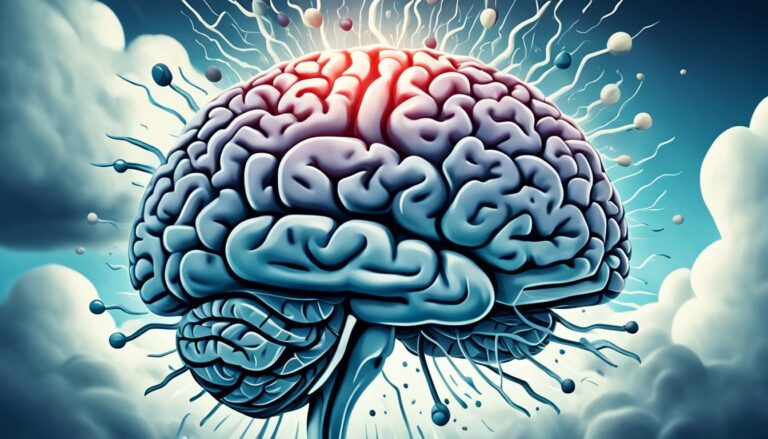A hangover isn’t just a physical issue; it also affects your mind, leading to hangover depression. It’s important to know why hangovers make you feel down to recover better. Drinking alcohol can dry out your body, making you more anxious and changing your mood. Also, not having enough folic acid can make you feel more depressed, especially if you drink alcohol.
Research shows that drinking alcohol can make anxiety disorders worse, leading to more emotional ups and downs after drinking. This article will look into how hangovers and mental health are connected. We’ll also share ways to get over hangover depression.
Key Takeaways
- Hangovers can lead to dehydration, intensifying feelings of anxiety and depression.
- Low folic acid levels linked to alcohol consumption may affect mood disorders.
- Alcohol can disrupt sleep quality, worsening emotional states.
- Mindfulness techniques can aid in managing anxiety post-hangover.
- Discussing feelings with friends can buffer against hangover depression.
Understanding Hangovers
Hangovers come from dehydration, chemical imbalances, and the body’s reaction to alcohol withdrawal. They can make you feel tired, give you headaches, and upset your stomach. It’s important to understand these factors to know how they affect your mood and mental health.
How long a hangover lasts can vary a lot from person to person. Some might feel better in a few hours, while others could take a whole day or more to recover. This depends on how much alcohol you drink and how your body handles it.
Drinking too much alcohol over time can lead to serious health problems. It can make you more anxious and depressed. In fact, studies show that people who drink too much alcohol are more likely to get major depression than others.
Knowing the signs of a hangover can help you feel better and check on your health. Drinking plenty of water, eating well, and getting enough sleep can help you recover faster. This makes it easier to bounce back to normal.
Why Hangovers Make You Feel Depressed and How to Bounce Back
Alcohol and mood have a complex relationship. Many people think alcohol helps them relax and have fun. But, it can also lead to big emotional changes.
At first, alcohol can make you feel better. But then, you might start to feel sad or down. This happens because the happy feelings from drinking go away, leaving you feeling blue.
The connection between alcohol consumption and mood
Drinking can make you feel happy, but these good feelings don’t last long. The happiness you feel might hide the bad effects drinking has on your mind. Drinking too much can lead to feeling anxious or depressed over time.
Feeling down after drinking is common. These feelings can last for days, showing you might have deeper issues like anxiety or depression. It’s important to understand this to get better.
Short-term vs. long-term effects of alcohol on mental health
Drinking can have short-term and long-term effects on your mental health. Right after drinking, you might feel moody or irritable. Over time, it could lead to ongoing mental health problems.
How you react to alcohol can change a lot. It can depend on how hydrated you are and your overall health. To avoid the bad effects of alcohol on your mood, try taking care of yourself and drinking in moderation.
The Science Behind Hangover Depression
Alcohol’s effects go beyond the fun feelings during a night out. It changes brain chemistry, affecting mood-regulating neurotransmitters. This is why hangovers can make people feel so bad.
Alcohol’s impact on brain chemistry
Alcohol changes brain chemistry a lot. It makes neurotransmitters like dopamine release, making you feel happy and euphoric. But when the effects fade, these neurotransmitters drop. This can lead to anxiety and depression during recovery.
Studies show that dopamine levels in the brain go down during a hangover. This makes mood swings and anxiety worse.
Neurotransmitters and their roles in mood regulation
Neurotransmitters and mood are closely linked. Hangovers often make people feel sad and irritable. Stress from a hangover raises cortisol, blood pressure, and heart rate.
This stress, along with lack of sleep, hurts mental function. It makes it hard to handle emotions well. About 12% of people feel anxious during a hangover, showing how mood changes can lead to drinking problems and conflicts.
| Neurotransmitter | Function | Hangover Impact |
|---|---|---|
| Dopamine | Responsible for pleasure and reward | Lower levels lead to decreased mood and increased anxiety |
| Serotonin | Regulates mood, anxiety, and happiness | Decreased availability can worsen feelings of depression |
| Cortisol | Controls stress response | Higher cortisol levels during hangover contribute to anxiety |
Physical Symptoms of Hangovers
A hangover can make you feel really bad, often worse than the fun you had the night before. You might feel dehydrated, nauseous, or have a headache. These symptoms come from alcohol drying out your body and affecting your mental health. It’s important to know how dehydration affects your mind to understand the hangover’s impact.
Dehydration and its effects on mental state
Dehydration is a big reason for hangover symptoms. Drinking alcohol makes you pee more, so you lose fluids. This can make it hard to think clearly, remember things, or focus. Without enough water, you might feel grumpy or sad, making it harder to get better.
Common physical ailments accompanying hangovers
Hangovers can bring on several physical problems, such as:
- Headaches
- Dizziness
- Nausea
- Tiredness
- Poor sleep quality
- Mood disturbances
These symptoms can make you feel bad for up to a day after drinking. They can affect how you do your daily tasks and might make you less productive at work or school. Drinking plenty of water and eating foods rich in vitamins B and C can help you feel better. If you have trouble with alcohol, trying natural foods for your mental health might help. You can learn more about this at this link.

| Hangover Symptom | Duration | Impact on Recovery |
|---|---|---|
| Headache | Up to 24 hours | Can hinder concentration |
| Dizziness | 6-12 hours | Impacts balance and coordination |
| Nausea | 6-24 hours | Decreases appetite and fluid intake |
| Tiredness | 12-24 hours | Slows recovery process |
| Poor sleep quality | Varies | Exacerbates physical and mental symptoms |
The Role of Quality Sleep
It’s key to understand how alcohol affects sleep. Drinking can mess with our body’s natural sleep cycles, especially during REM and NREM sleep. These stages are crucial for both physical and emotional health. They help us bounce back and keep our mood stable.
When sleep gets disrupted, it can make anxiety worse. This creates a tough cycle for those dealing with hangovers.
How alcohol disrupts sleep patterns
Alcohol messes with sleep, especially REM sleep, which is key for emotional and mental recovery. At first, it makes us sleepy, but later, it causes trouble that lowers sleep quality. This mix of calming and stimulating effects leads to restlessness and feeling groggy in the morning.
This can make us feel tired and affect our mood, even after drinking a bit. It shows how alcohol can hurt our sleep and mood.
Importance of REM and NREM sleep in recovery
Quality sleep is essential for recovery. REM sleep helps with emotions and memory, while NREM sleep fixes the body. Without these stages, stress hormones go up, making us more anxious.
This shows how important it is to manage alcohol use and focus on good sleep habits. Knowing this can help people handle their drinking better and improve their mental health.
Coping with Hangovers: Hydration and Nutrition
Dealing with hangovers can be tough, but staying hydrated and eating right helps a lot. Using good hydration tips and focusing on nutrition can make you feel better faster.
Recommended fluids for recovery
Keeping hydrated is key when you’re hungover. Alcohol makes you lose fluids, which can be a lot after just four drinks. To get back on track, try these drinks:
- Water: Simple and essential for rehydration.
- Sports drinks: Beverages like Gatorade can restore lost electrolytes and better retain fluids compared to water.
- Coconut water: An excellent source of hydration and potassium.
- Herbal teas: Gentle on the stomach and hydrating.
Nourishing food options that aid recovery
Eating foods full of nutrients also helps you recover. These foods boost your blood sugar and refill important nutrients. Here are some good choices:
- Fruits: Bananas are rich in potassium, essential for hydration.
- Whole grains: Foods like toast with honey can provide quick energy through carbohydrates.
- Cantaloupe: Its high water content aids in rehydration.
- Ginger: This root can soothe an upset stomach and reduce nausea.
Avoid greasy foods as they don’t help with hangover symptoms and can make nausea worse.
By using these fluids and foods, you can help yourself recover from hangovers effectively.
Exercise as a Recovery Tool
Physical activity is a great way to recover from a hangover. It can make you feel better emotionally. When you move, your body releases endorphins, which make you feel happy.
This helps fight off the sadness and tiredness that come with a hangover.
The benefits of physical activity on mood
Exercise helps with both physical and emotional recovery from a hangover. It can reduce anxiety and depression. After working out, you might feel more awake and full of energy.
This is the opposite of how you feel during a hangover. Adding exercise to your recovery plan helps with both your body and mind.
How movement can help alleviate hangover symptoms
Moving around can ease hangover symptoms like headaches and dizziness. Light to moderate exercise can help with dehydration and tiredness. Activities like walking or stretching improve blood flow and help with detox through sweat.
This can make you feel better faster and improve your mood at the same time.
| Exercise Type | Duration | Mood Benefits | Hangover Relief |
|---|---|---|---|
| Walking | 30 minutes | Improves mood and reduces stress | Enhances circulation and hydration |
| Yoga | 30 minutes | Increases relaxation and mindfulness | Reduces muscle tension and fatigue |
| Cycling | 30 minutes | Boosts energy levels | Helps detoxify through sweat |
| Stretching | 15 minutes | Relieves physical discomfort | Helps alleviate headaches |
Connecting with Friends for Support
Talking to friends is key when you’re feeling the effects of a hangover. Sharing stories and feelings can make you feel less alone and anxious. It helps ease the sadness and isolation that come with hangover blues.
The importance of social interactions in recovery
Being around others is crucial when you’re recovering from a hangover. Feeling let down by social situations can make you feel sad after a big night out. Comparing yourself to others can also make you uncomfortable. But, real friendships can make you feel true to yourself.
Talking deeply with friends can ease your emotional pain. It helps fight off feelings of not being good enough or too tired to be social.
Tips for effective communication with friends
Here are some tips for building strong friendships and talking well:
- Talk openly: Be honest about how you’re feeling and what’s bothering you. This helps others understand you better.
- Practice active listening: Pay attention to what your friends say and show you care about their lives.
- Be mindful of timing: Pick the right time to talk about sensitive topics to avoid upsetting anyone.
- Encourage balance: Talk about the need to drink in moderation to avoid hangover depression later.
- Offer support: Let your friends know you’re there for them as they deal with their own hangover feelings.
Having good friends is great for your mental health. Talking after drinking helps you recover and builds stronger relationships. It also helps you deal with anxiety and sadness. Getting support during hangovers can lead to better emotional health and resilience in the future.
Identifying Triggers for Hangover Depression
It’s key to find out what makes hangover depression worse. By looking at your drinking habits, you can spot patterns that affect your mood. Keeping a journal can show how drinking affects your mental health. This knowledge helps you make better choices about drinking and manage hangover triggers.
Understanding your personal drinking habits
Think about times when you drank a lot and how you felt. People with depression often feel worse after drinking. Knowing this can help you see how drinking affects your mental health.
Strategies to minimize triggers
There are ways to lessen the impact of hangover triggers on your mood. Here are some tips:
- Set clear limits on alcohol consumption before social events.
- Have a supportive friend with you to help keep your drinking in check.
- Drink water throughout the event and after to stay hydrated.
- Eat balanced meals to keep your blood sugar stable.
- Do some light exercises, like walking, to improve your mood and energy.
These steps are important for avoiding hangover depression and a better relationship with alcohol. Mindfulness meditation or deep breathing can also reduce anxiety from hangovers. If you’re dealing with mental health issues, getting professional help can be a big support.
Healthy Coping Mechanisms
Finding ways to deal with stress can make us feel better overall. It’s key to use healthy ways to handle stress, especially after a hangover. Doing things other than drinking helps cut down on alcohol and supports a balanced life.
Alternative activities to alcohol for stress relief
Switching to better habits can help reduce stress and clear your mind. Here are some activities to try:
- Yoga: It makes you more flexible and helps you relax.
- Art and Crafting: Being creative can be really helpful.
- Outdoor Activities: Being in nature lowers stress and lifts your mood.
- Reading: Getting lost in a book can be a great distraction.
- Cooking: Making healthy meals is good for your body and mind.
Mindfulness and relaxation techniques
Adding mindfulness to your day can really cut down on stress. These methods make you more aware and peaceful:
- Meditation: Doing it every day helps with your thoughts and feelings.
- Deep Breathing Exercises: These simple moves can calm you down.
- Progressive Muscle Relaxation: It helps you relax your body.
- Journaling: Writing things down can clear your mind and ease stress.

The Importance of Moderation
Drinking alcohol in moderation is key for staying healthy. It helps avoid the bad effects of too much drinking. Drinking in moderation can lower the chance of feeling sad or low after drinking.
Setting limits on how much alcohol you drink is good for your health. It can reduce the negative effects on your mind and feelings.
Guidelines for responsible drinking
It’s important to follow guidelines to have a healthy relationship with alcohol. Women should not have more than one drink every hour. Men can have up to two drinks in the same hour. This helps keep a balance between drinking and mental health.
Knowing your limits helps improve your life and lowers the risk of getting a mood disorder from alcohol. This disorder can last even after the hangover is over.
Setting personal limits to prevent hangover depression
Setting your own limits on drinking can help avoid feeling down after drinking. Drinking too much or binge drinking can lead to bad mood changes. Being aware of how much you drink and drinking in moderation can make you feel clearer and more stable.
It’s good to get support from others to manage your drinking better. For more information on managing mood and brain fog, check out this resource on depression and brain fog.
| Group | Recommended Drink Limits | Risk of Depression |
|---|---|---|
| Women | 1 drink per hour | Lower risk when adhering to limits |
| Men | 2 drinks per hour | Increased risk with heavy drinking |
| Moderate Drinkers | 1-2 drinks total | Lowest risk of alcohol-induced issues |
| Heavy Drinkers | Varies significantly | Higher risk of hangover depression |
Seeking Professional Help
Knowing when to get help is key for those dealing with ongoing depression after drinking. Talking to a professional can offer guidance and support. It helps with managing alcohol use and mental health issues. It’s important to recognize depression symptoms early.
When looking for help, consider these points.
When to consider counseling or therapy
If sadness or hopelessness lasts for weeks, it’s time to think about counseling for hangover depression. People who feel this way often benefit from professional help. It can help uncover deeper issues. You might need to seek help if you use alcohol to deal with problems like relationship issues or job loss.
Resources for mental health support
- Local mental health clinics offer counseling services tailored to individual needs.
- Hotlines provide immediate support for those in crisis situations.
- Self-help groups can create a supportive community for sharing experiences and strategies.
- Cognitive-behavioral therapy (CBT) is an effective option for addressing negative thought patterns linked to alcohol use and depression.
Using these mental health resources can help you recover and improve your mental health. Getting help can lead to a better mood and mental well-being over time.

Hangover Remedies for Immediate Relief
When you wake up after a night out, finding quick relief from a hangover is key. There are many options, from home remedies to medicines. Knowing which ones work best can help you feel better faster.
Popular home remedies that may ease symptoms
Many people turn to home remedies for hangovers because they’re natural. Here are some hangover cures that work well:
- Hydration: Drinking lots of water helps your body recover from dehydration caused by alcohol.
- Ginger Tea: Ginger tea can ease nausea and soothe an upset stomach.
- Korean Pear Juice: Studies show that this juice might lessen hangover symptoms.
- Bananas: Bananas are good for replenishing potassium levels that drop after drinking.
- Rest: Sleeping helps your body recover and regain energy.
Pharmaceutical options to reduce discomfort
For fast relief from hangover symptoms, medicines can be helpful. Some options include:
- Over-the-counter Pain Relievers: NSAIDs like ibuprofen can ease headaches and body aches. But, be careful not to irritate your stomach.
- Caffeine: Some people use caffeine to feel more awake, but too much can make dehydration worse.
Knowing about these remedies lets you choose the best way to deal with a hangover. Home remedies offer a natural way to feel better, while medicines can provide quick relief for pain and discomfort.
Long-term Strategies for Preventing Future Hangovers
Preventing hangovers can make you feel better overall. By changing your lifestyle for the better, you can handle your drinking habits better. This means looking at how much you drink and making smart choices about alcohol.
Implementing lifestyle changes
Living healthier can really cut down on hangovers. Here are some tips:
- Limit alcohol consumption: Following the recommended drinking limits can lower your hangover risk.
- Stay hydrated: Drinking water before, during, and after drinking helps prevent dehydration, a big cause of hangovers.
- Choose lower congener drinks: Pick drinks like vodka or gin that are clear to lessen hangover effects.
- Maintain a balanced diet: Eating foods full of nutrients helps keep your blood sugar stable, making hangovers less likely.
- Prioritize sleep: Getting enough rest helps you recover faster and reduces the bad effects of drinking.
Understanding your drinking habits
Knowing and controlling your drinking habits is key to staying healthy. Think about these tips:
- Self-reflection: Writing down or tracking how much you drink can show you what makes you drink too much.
- Identify triggers: Knowing what makes you drink too much can help you make better choices at social events.
- Seek support: Talking to friends or joining groups can help you stay on track with your drinking.
| Strategy | Description | Benefit |
|---|---|---|
| Limit Alcohol | Stick to recommended drinking limits. | Reduces hangover risk. |
| Hydration | Consume water alongside alcohol. | Prevents dehydration and related symptoms. |
| Lower Congeners | Select lighter alcohol options. | Decreases hangover severity. |
| Balanced Diet | Fuel the body with nutritious food. | Stabilizes blood sugar and mood. |
| Prioritize Sleep | Ensure adequate rest post-drinking. | Promotes recovery. |
Using these strategies helps you understand your drinking habits better. It also improves your health. Taking these steps helps you manage your alcohol better, leading to a happier and healthier life.
Addressing Underlying Mental Health Issues
Understanding how alcohol use and mental health are linked is key to recovery and treatment. Many people deal with mental health issues and alcohol use, making anxiety and depression worse. Dealing with these problems helps in healing.
The link between alcohol use and mental health disorders
The relationship between mental health and alcohol use is complex. About 20% of those with anxiety use alcohol to cope. Drinking to cope can lead to alcohol use disorder. In fact, 43% of depressed people who drank to cope later got this disorder. Long-term alcohol use can change brain chemistry, making anxiety and depression worse.
Understanding depression vs. hangover depression
It’s important to know the difference between hangover depression and real depression. Hangover symptoms, like feeling tired and irritable, can be similar to depression. But real depression lasts longer and needs different treatment. Activities like exercise, being in the sun, and drinking water can help with hangover depression. But, they don’t fix deeper mental health issues. Getting help from a professional is key for those with both mental health issues and alcohol use disorder.
| Factor | Hangover Depression | Clinical Depression |
|---|---|---|
| Duration | Typically fades within 24 hours | Presents for weeks or longer |
| Triggers | Alcohol consumption | Multiple psychological and environmental factors |
| Treatment | Hydration, sleep, and nutrition | Therapy, medication, lifestyle changes |
| Associated Risks | Mild anxiety and irritability | Severe mood disturbances, potential for self-harm |
Handling both hangover depression and clinical depression with the right strategies and support can improve mental health. Knowing the differences helps in finding the best way to recover.
Conclusion
Hangover depression shows how mental health and alcohol use are closely linked. Knowing how hangovers affect our feelings is key. It highlights the need for good ways to deal with hangovers.
These strategies help people get over hangovers and lessen the bad effects of alcohol on mental health. By understanding what causes hangover depression—like dehydration, poor sleep, and not eating well—people can take steps to feel better faster. It’s important to drink water, eat well, and stay active to improve mood and mental health.
Combining awareness of drinking habits, support from others, and mindfulness can really help with hangover depression. For more tips on dealing with mental health after having a baby, check out this resource. Using these methods helps with recovery and builds a healthier relationship with alcohol, making life happier.


